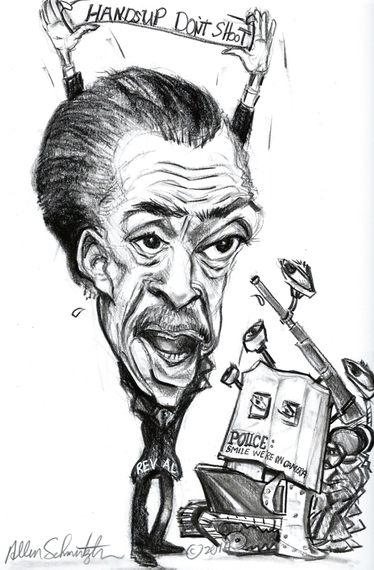
There was a celebratory flavor in 2008 and again with the affirmation election of 2012 when America felt it had become a post-racial society by turning the White House and secret codes over to our first President-Of-Color. Unfortunately, that was the easier step in what now looks to be a long and painful process to truthfully fulfill that ideal. To undermine and alter the local systemic racially dysfunctional infrastructure that resides insidiously from sea to shining sea will be the true and way harder task. Ferguson, Missouri was only another lit match on the drought of an honest societal wide discussion about race and social class in America. Bad news infused with racial color has been live streaming across the media all year. There is more to come. Even the President's daughters have now been targeted and racially slimed.
While a raw societal Ferguson mindset simmers across the country, President Obama, needing to look as though he is leading, invited notables to the White House for a summit aimed at problem solving the distrust and racial divide that Ferguson represents in America. Obama stated that this time, "things will be different," because he, as the President is going to dedicate his last two years of office to work at that. Again invited and present at the President's advisory gathering was the once over-bloated incendiary civil rights warrior, the Reverend Al Sharpton. Currently, Reverend Al sports a toned stealth physique clothed in fine threads and is ever the activist for racial justice. His tireless voice still drones unapologetically when confronting inequality, but it is now more polished, focused and tempered so as to be welcomed from the streets to the suites. Even he has stated that things will be different this time around. I am not so sure.
We are living in a failing democracy with a hyper-militarized police force married to our Homeland Security apparatus. Security-surveillance cameras are everywhere. Obama is not proposing to size down the militarization of the police, or the surveillance state. Rather he is using this opportunity to strengthen it. Obama is advocating more training along with Federal standards and asking for $75 million for 50,000 police body cameras. I guess the belief here is that we will all behave better under the ever-present watchful video camera. The cynic in me is wondering which tech company, friendly to Obama and Democrats, wins this rich government contract. But of greater concern for me, is that the cameras might be a false sense of real change.
Let's revisit the Rodney King beating and the criminal case against Los Angeles police officers in "Powell and Koon v. California," that sparked even worse race riots. This was the first time ever that a video camera was used in a trial, the video as eyewitness. The entire country, even the sitting president at the time, seemed to view the video as a slam-dunk to convict the officers of brutality. But the defense used the video to their advantage. The jury was led to interpret the video to favor the actions of the officers, just as any eyewitness can in cross-examination create duplicity, ambiguity and doubt as to what really occurred. We will always have a "before-the-camera and an after-the-camera" time period where a "he-said, she-said, he-did" testimony will get digested before the wheels of justice grind out the truth. Grand Juries will still hear police officers testify using language very reminiscent of the Rodney King episode, just as was stated by the officer responsible for shooting the young man in Ferguson, and most Grand Juries will not indict police officers. Prosecutors and police officers rely on each other.
Police wearing cameras may be a better situation that what we currently have. But with another government task force without a society willing to do the harder work, I remain the cynic. Americans must move beyond our self-back slapping congratulatory blindness and surrender to introspection to truthfully absolve us from the lingering and pervasive post slavery-racist history to move past it so as to inspire a future where "equal justice under the law" is a trusted brand. Everyone, of every color, faith and being must first admit we all have a problem, without pointing fingers. This must be a bottom-up and a top-down process. We all need to reach across the aisle and spend time with different people. More tanks, armor and cameras makes it look as though we are even more divided and in a domestic war, and unless everyone with a particular viewpoint is eliminated, ideas, attitudes and hatred will survive, and maybe even harden. It will take more than Hands up, don't shoot, smile, you're on camera.
